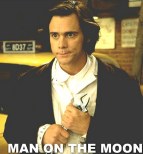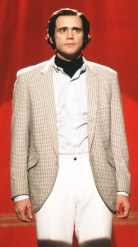| Man
on the Moon |
| |
|
|
USA, 1999. Rated R. 118 minutes.
Cast: Jim Carrey, Danny DeVito, Courtney
Love, Paul Giamatti, George Shapiro, Vincent Schiavelli, Peter Bonerz,
Jerry Lawler, Gerry Becker, Bob Zmuda, Jeff Conaway, Marilu Henner, Judd
Hirsch, Carol Kane, Christopher Lloyd, Lorne Michaels
Writers: Scott Alexander & Larry Karaszewski
Music: Peter Buck, Mike Mills, Michael Stipe
Cinematographer: Anastas N. Michos
Producers: Danny DeVito, Michael Shamberg, Stacey Sher
Director: Milos Forman
|
| Grade:
D+ |
Review by
Dana Knowles |
 ny
individual response to this film has a crucial bottom line factor: either
you enjoy and embrace Jim Carrey's incarnation of Andy Kaufman or you don't.
If you do, there may be entertainment value in this "greatest hits" collection
of Kaufman's most famous performances and stunts. If you don't, the experience
of sitting through Man on the Moon may range from tedious to excruciating.
I didn't enjoy or embrace Carrey's performance, and thus found almost nothing
to enjoy or embrace about the film itself. As the story unfolds, we're treated
to recreations of Kaufman's work, strung together with brief behind-the-scenes
vignettes that seem to have one (and only one) thing to say: wasn't this guy
just too weird to grasp?
ny
individual response to this film has a crucial bottom line factor: either
you enjoy and embrace Jim Carrey's incarnation of Andy Kaufman or you don't.
If you do, there may be entertainment value in this "greatest hits" collection
of Kaufman's most famous performances and stunts. If you don't, the experience
of sitting through Man on the Moon may range from tedious to excruciating.
I didn't enjoy or embrace Carrey's performance, and thus found almost nothing
to enjoy or embrace about the film itself. As the story unfolds, we're treated
to recreations of Kaufman's work, strung together with brief behind-the-scenes
vignettes that seem to have one (and only one) thing to say: wasn't this guy
just too weird to grasp?
Man on the Moon opens with a fairly amusing stunt: Carrey as Kaufman,
warning the audience that the movie is horrible and that we should all go home.
Apparently, I'm one of the few who wishes she had taken his advice. What follows
is the introduction of Kaufman as a child, driven to perform alone in his room
until his father points out that--without an audience--he's not really a performer.
Thus, he recruits his little sister... and launches his career as a performance
artist. From there, we leap to Kaufman performing on a real stage and provoking
mostly confusion or disinterest from his audience. The club manager apologetically
"fires" Kaufman afterward, pointing out that he's not funny and that he's driving
the customers out the door. Kaufman--apparently deeply saddened by his dismissal--argues
that their departure is a response, and that getting a response is the most
important thing. The club owner sticks to his guns, and Kaufman departs, appearing
at first to be deeply distraught, and then breaking out in a smile... as if
his "emotional distress" was just a put-on the whole time. This scene set the
stage for my loathing of the bulk of Carrey's performance, because his display
of distress is atrociously bad. Regardless of whether he meant for Kaufman to
be faking sadness or actually feeling it, it's lousy, hammy acting of the sort
you'd find in silent films. Kaufman himself could (and often did) pull of the
illusion of being emotionally crushed by audience response, which means that
he was a far more gifted actor than Carrey is. Later in the film, Carrey will
be crushed a couple more times... when Taxi is canceled (drying up his
income) and when the SNL audience votes to ban him. Neither of those moments
is handled with any greater subtlety than the first. Carrey's eyes seem to be
all but screaming, "Hey... I'm really SAD about this!"
Kaufman was an oddball and an enigma, to be sure. It should have been interesting
to go backstage with him or home with him and get a closer look at a performer
whose style was practically indefinable and whose career choices were bafflingly
self-defeating. But Man on the Moon's choices are also bafflingly self-defeating.
The film concedes defeat from the outset, as if there is no possible way
to establish a point of view about Kaufman or his persona, and thus, why bother
to try? To which my personal response is: okay, then why bother to make a film
in the first place? Biopics and biographies exist because there is a presumed
interest in the "why" behind the "what" of an individual's life. In the case
of an artist, the art is the "what". It's the known quantity that generates
interest in the artist as a person beyond his accomplishments. But if all you're
going to do is show us the "what", there's little hope that anything will resonate
beyond the moment of watching it pass. It's odd that this director and these
writers collaborated so gutlessly on this portrait, considering the audacity
and enthusiasm they poured into their speculative tribute to the life and work
of phenomenally talentless film director, Ed Wood. Imagine that film consisting
of nothing but restaged scenes from Wood's movies, and you've got the essence
of what's wrong with Man on the Moon. Better yet, imagine a biopic on
JFK consisting of little more than recreations of his public appearances and
speeches. Wouldn't newsreel footage be just as (if not more) enlightening? Still,
if the notion of watching Carrey pull off a complex physical imitation of Kaufman
appeals to you, the absence of further enlightenment may not matter at all.
There's plenty to work with in Kaufman's life, but Forman and company seem
wary of delving into it or taking any angle on it. Apparently, Kaufman hated
Taxi and felt it was beneath his talents to appear on the show. And yet
he did, for five years! These points are established vaguely, but never explored
beyond making it clear that the filmmakers want us to know that Kaufman
wouldn't want the public to fancy it as his legacy to entertainment. Fascinating!
What about showing the price he paid for whoring himself to something he detested?
That might have been interesting, but it would also remind us that he did
whore himself, and there's no room in this film for that sort of reality. Better
to imply that his suffering came only from the fact that the show was somehow
beneath his genius. Another bit of unmined territory is his motivation for sticking
with the wrestling gag for so long that it vilified him in the public eye and
ruined his career. In the film, there is nothing shown that would indicate why
he kept going in that direction, and when faced with the damage it's doing to
him, Andy seems clueless as to why. Sheesh... a brilliant guy like Kaufman couldn't
fathom why a one-note joke wasn't still funny years and years later?
Speculation as to Kaufman's motives and his character wouldn't have been any
sort of crime against his memory or his art. Forman's Amadeus goes out
of its way to paint a garish and complex portrait of Mozart the man... so surely
he understands that just because we cannot know if our guesses are factually
true, it's no dishonor to make them if they present a plausible version of the
man behind the art. I think their problem with speculating about Kaufman stems
from the likeliest truth: Kaufman's deepest motivation was nothing more or less
than a desperate desire for attention, combined with a fundamental contempt
for popular culture and the mindlessness of the audiences who embraced its comforting
emptiness. (Of course, this raises an interesting question: why did he covet
the attention of those mindless folks in the first place?) Kaufman's genius
was in recognizing that fame is nothing more than a function of getting people's
attention, and that the most effective way to get attention is to do what is
least expected. (A workable philosophy, as it turns out. Ask Camille Paglia.)
Thus, his early work was about being "bad" at being an entertainer. His "foreign
man" comedian (later evolving into Latka on Taxi) was a man who had no
business being in show business. His combination of squirmy stage fright and
non-existant grasp on comedic timing were funny because it was hard to imagine
anyone less funny, or less qualified to step onto a stage in the first place.
His Mighty Mouse bit was funny because the notion that someone would
concoct such an absurdity as "entertainment" or a display of talent rang bells
with the mid-70s zeitgeist of cynical disbelief at what was happening in the
real world. (It's no coincidence that The Gong Show was a huge hit at
the same time as Kaufman rose to fame.)
Later, Kaufman would employ the same strategy of going against expectations,
turning his own image of sweetness upside-down by wrestling women while spewing
(obviously tongue-in-cheek to anyone who "got" him) vitriol. While it is established
in the film that Kaufman was in search of quantifiable reactions, a huge opportunity
is missed by ignoring the most probable explanation for his seemingly endless
wrestling fixation. Having gained the (mindless, to his way of thinking) adoration
of the masses as Latka or for his cute bits on SNL, he seemed determined to
manipulate those fans into turning that love into hatred... as if he needed
to prove to himself that he could maintain control over public reaction by sheer
force of will. He succeeded beyond his wildest dreams, generating intense disapproval,
stirring up debate about whether his misogyny was sincere, and later about whether
any of it was ever funny at all. But when he kept going and going and going
with wrestling, the public got bored and irritated, dismissing him and all but
forgetting about him, clearly the exact opposite of his intent. So why did he
keep going? Forman won't speculate, so I may as well. I think Kaufman became
addicted to the extremity of the hatred he generated in the ring at those public
events... so addicted that he couldn't bear to let go of the rush and walk away
from what began as an absurdity meant to provoke a more widespread public reaction.
The immediacy and primitivism of the enraged wrestling fans must have been a
perfectly distilled version of what he'd been after all along, the power to
provoke on a gut level. The notion that he trashed his own career to wallow
in this concentrated hatred is fascinating, but you'd never guess that from
the movie. In the movie, he just thinks the public isn't "getting" his joke.
There are a few dramatic nuggets to savor in Man on the Moon. The moment
when a desperately ill Kaufman is duped by a charlatan "healer" in the Philippines
is inspired both in its staging and in Carrey's performance. And the ultimate
irony of Kaufman's early death provides a bit of resonance that I suppose was
allowed because it required absolutely no speculation. Kaufman had been staging
bizarre hoaxes for so long that his illness and death were believed by many
to be just one more. It's poignant to see him suffer this comeuppance, at once
earned and unbelievably cruel. Carrey's performance actually works in the last
few scenes, as he reflects Kaufman's physical weakness by dropping his energy
level way, way down and giving his too-busy eyes a rest.
For me, however, the good stuff was too little and too late. The majority of
the film is clumsily executed at best, particularly with regard to the incessant
(and awful) shots of audiences reacting to Kaufman's performances. Major characters
are dropped in and left dangling, particularly Kaufman's girlfriend Lynn (Courtney
Love), who appears and then hangs around the fringes a bit so she can later
voice the major insight of the movie when she tells Kaufman that there
is no "real" Andy. Considering that (as a fan of the real guy, even if there
was no "real" guy) I already had a vested interest in Kaufman's story and fate,
it was surprising to realize the minimal degree to which I was affected or moved,
even by the ending. Quite frankly, this film doesn't do him justice as either
an artist or a man. By staging a phony last-minute triumph that does not at
all reflect the actual trajectory of Kaufman's career, Forman only proves how
much he fears his own subject's real story. The intent of shifting Kaufman's
Carnegie Hall gig to the end of his career may have been a noble one, implying
that Andy's legacy and importance did (or will) survive his real life last-act
failures, but it smacks of gutlessness to me... the same sort of gutless desire
to give the audience "what it wants" as this very movie congratulates Kaufman
for loathing about sitcoms and other popular culture. What sort of a tribute
is that to the spirit of this particular man? Kaufman himself would almost certainly
find the shallow blandness of this effort to be as annoyingly dull and empty
as I did. I wish his death really had been a hoax so he could come forward and
say so.
Review © January
2000 by AboutFilm.Com and the author.
Images © 1999 Universal Pictures. All Rights Reserved.



